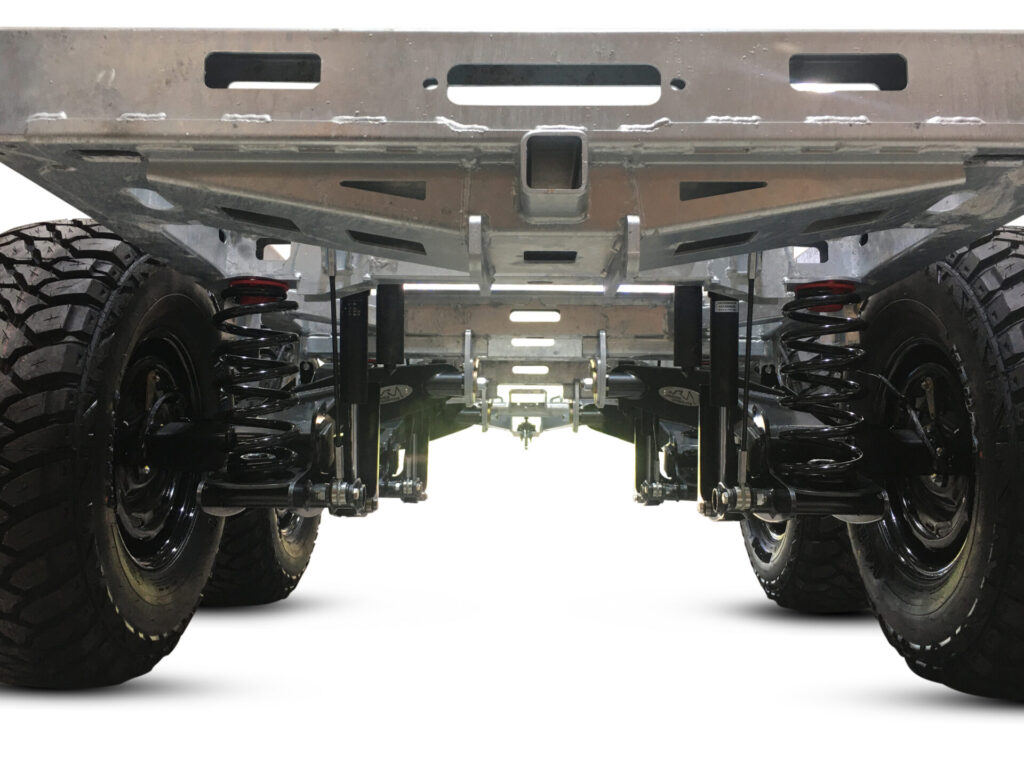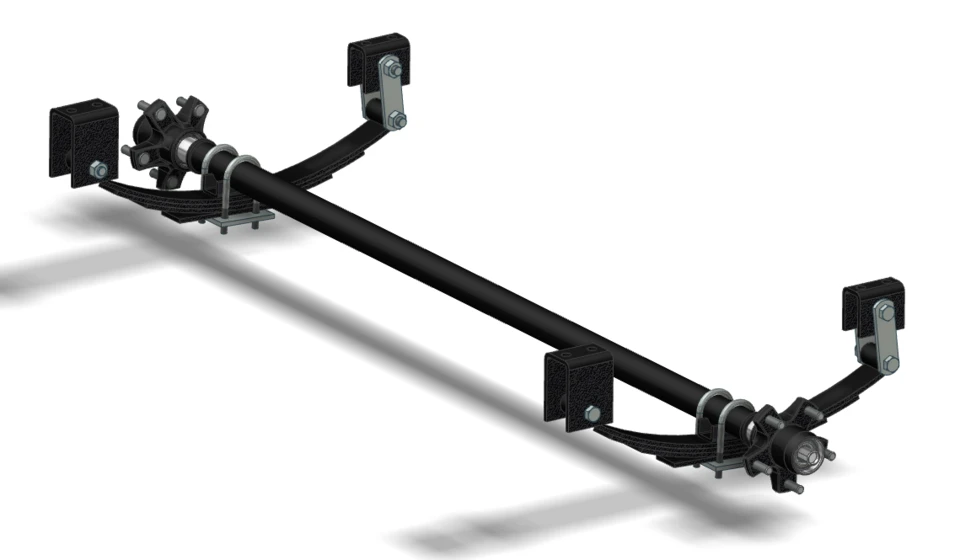Product Description
Our company is a professional trailer axle manufacturer with 20 years experience,we have well trained workers, workshop,we have been a 10 years vendor of trailer axles and mechanical suspension.Holding ISO9001;2000,ts16949 certificate, so we have confidence to provide superior quality and competitive offers for global valued customers.
| Germany Type Bogie Suspension | ||||||||||||
| Rated Load (kg) | Weight (kg) | Bearing Type | Axle Beam | Brake Size | Track Length A | Tyre Bolt | Steel Turn Position | Wheel Base B | C mm | D mm | E mm | F mm |
| 24000 | 2571 | 33118 33213 | SQUARE 150*14 | 420*180 | 1870mm | 10-M22*1.5 | 280 | 1385 | 900 | 600 | 700 | 55 |
| 24000 | 2080 | 33118 33213 | SQUARE 150*14 | 420*200 | 1870mm | 10-M22*1.5 | 280 | 1385 | 900 | 600 | 700 | 55 |
| 28000 | 2455 | 33215 32219 | SQUARE 150*14 | 420*200 | 1870mm | 10-M22*1.5 | 280 | 1550 | 900 | 600 | 800 | 55 |
| 32000 | 2520 | 32314 32222 | SQUARE 150*16 | 420*200 | 1870mm | 10-M22*1.5 | 280 | 1550 | 900 | 600 | 800 | 55 |
| 36000 | 2600 | 32314 32222 | SQUARE 150*18 | 420*220 | 1870mm | 10-M22*1.5 | 280 | 1550 | 900 | 600 | 800 | 55 |
/* January 22, 2571 19:08:37 */!function(){function s(e,r){var a,o={};try{e&&e.split(“,”).forEach(function(e,t){e&&(a=e.match(/(.*?):(.*)$/))&&1
| After-sales Service: | 1year |
|---|---|
| Warranty: | 1year |
| Material: | Steel |
| Customization: |
Available
|
|
|---|
.shipping-cost-tm .tm-status-off{background: none;padding:0;color: #1470cc}
|
Shipping Cost:
Estimated freight per unit. |
about shipping cost and estimated delivery time. |
|---|
| Payment Method: |
|
|---|---|
|
Initial Payment Full Payment |
| Currency: | US$ |
|---|
| Return&refunds: | You can apply for a refund up to 30 days after receipt of the products. |
|---|

Can you provide examples of trailers or towing applications that commonly use suspensions?
Yes, various trailers and towing applications commonly use suspensions to ensure optimal performance, stability, and ride comfort. Here are some examples:
- Utility Trailers:
- Recreational Trailers:
- Horse Trailers:
- Boat Trailers:
- Commercial Trailers:
Utility trailers, including flatbed trailers, enclosed trailers, and landscape trailers, often utilize suspensions. These trailers are used for a wide range of purposes such as transporting equipment, materials, or goods. Suspensions help provide a smoother ride and improved load-carrying capacity, ensuring that the trailer can handle different types of cargo and road conditions.
Recreational trailers, such as travel trailers, fifth-wheel trailers, and toy haulers, commonly incorporate suspensions. These trailers are designed for recreational purposes, including camping, road trips, and outdoor adventures. The suspensions help enhance ride comfort, stability, and handling characteristics, providing a more enjoyable towing experience for the occupants.
Horse trailers, which are specifically designed to transport horses, often utilize suspensions. These trailers typically have special features such as dividers, ramps, and ventilation systems to ensure the safety and well-being of the horses during transportation. Suspensions play a crucial role in minimizing vibrations and shocks, providing a smoother ride for the horses and reducing their stress levels.
Boat trailers are used to transport boats from one location to another, such as from a storage facility to a launch site. These trailers need to accommodate the weight and dimensions of the boat while providing stability and maneuverability on the road. Suspensions help absorb shocks and vibrations, preventing damage to the boat and ensuring a smoother towing experience.
Various types of commercial trailers, including semi-trailers, refrigerated trailers, and tanker trailers, rely on suspensions. These trailers are used in industries such as logistics, transportation, and bulk liquid hauling. Suspensions are essential to handle heavy loads, maintain stability, and ensure safe and efficient transportation of goods over long distances.
These are just a few examples, and suspensions are utilized in a wide range of other trailer types and towing applications as well. It’s important for trailer owners and operators to select the appropriate suspension system based on the specific requirements of their trailers, including load capacity, intended use, road conditions, and regulations.
In summary, suspensions are commonly used in utility trailers, recreational trailers, horse trailers, boat trailers, commercial trailers, and many other types of trailers and towing applications. The inclusion of suspensions helps improve ride quality, stability, and handling characteristics, ensuring a safe and comfortable towing experience.

What safety considerations should be taken into account when using trailer suspensions in towing?
When using trailer suspensions in towing, it’s crucial to prioritize safety to prevent accidents and ensure the well-being of both the driver and other road users. Here are important safety considerations to keep in mind:
- 1. Weight Distribution: Properly distribute the weight of the cargo within the trailer. Ensure that the load is evenly balanced to prevent overloading of one axle or side, which can lead to instability and loss of control.
- 2. Load Capacity: Stay within the specified load capacity of the trailer suspension. Overloading can strain the suspension components, leading to premature wear and potential failure.
- 3. Regular Inspections: Conduct routine inspections of the trailer suspension system, including springs, shocks, and fasteners. Look for signs of wear, damage, or loose components. Address any issues promptly to prevent accidents.
- 4. Tire Maintenance: Ensure that trailer tires are in good condition, properly inflated, and have adequate tread depth. Bald or underinflated tires can lead to blowouts or loss of control during towing.
- 5. Brake System: Maintain the trailer’s brake system in optimal condition. Test and adjust the brakes as needed to ensure they provide effective stopping power. Inadequate brakes can result in longer stopping distances and accidents.
- 6. Trailer Lights: Ensure that all trailer lights, including brake lights, turn signals, and taillights, are functioning correctly. Proper lighting enhances visibility and signals your intentions to other drivers.
- 7. Trailer Hitch: Use a compatible and properly installed trailer hitch that is rated for the weight of your trailer and load. Make sure the hitch is securely attached to the towing vehicle and the trailer tongue.
- 8. Secure Cargo: Secure the cargo inside the trailer to prevent shifting during transit. Use appropriate tie-downs and restraints to keep the load stable and prevent accidents caused by cargo movement.
- 9. Driving Speed: Adhere to safe driving speeds and follow posted speed limits. Speeding while towing can reduce your ability to react to unexpected situations and increase the risk of accidents.
- 10. Towing Vehicle: Ensure that the towing vehicle is in good mechanical condition. Regularly service the vehicle’s engine, brakes, transmission, and suspension to maintain towing performance and safety.
- 11. Emergency Equipment: Carry essential emergency equipment, including a jack, spare tire, fire extinguisher, first aid kit, and reflective warning triangles. These items can be invaluable in case of roadside emergencies.
- 12. Weather Conditions: Adjust your driving behavior and maintain a safe following distance in adverse weather conditions, such as rain, snow, or ice. Wet or slippery roads can increase stopping distances and reduce traction.
- 13. Driver Training: Ensure that the driver has the necessary training and experience in towing trailers. Towing a trailer requires specific skills and awareness of handling differences compared to driving without a trailer.
- 14. Emergency Procedures: Familiarize yourself with emergency procedures, including how to react in the event of trailer sway, jackknifing, or other critical situations. Knowing how to respond can prevent accidents from escalating.
Prioritizing safety when using trailer suspensions in towing is essential for preventing accidents and ensuring a secure and efficient towing experience. Regular maintenance, proper load management, and adherence to safety guidelines are key to safe towing operations.

Can you describe the factors to consider when selecting trailer suspensions for specific applications?
When selecting trailer suspensions for specific applications, several factors need to be considered. Here’s a detailed explanation:
- Load Capacity:
- Towing Conditions:
- Trailer Type:
- Comfort:
- Budget:
- Maintenance and Durability:
- Special Requirements:
The load capacity of the trailer suspension is a crucial factor to consider. It should be able to handle the anticipated weight of the trailer’s cargo. The suspension system should have sufficient load-carrying capacity to support the payload and distribute the weight evenly across the axles.
The towing conditions play a significant role in determining the appropriate trailer suspension. Consider factors such as the type of terrain, road conditions, and towing speed. For example, if the trailer will be frequently used on rough or uneven roads, a suspension system with excellent shock absorption capabilities, such as an independent suspension or air suspension, may be preferred.
The type of trailer being used is an essential consideration. Different trailers have varying requirements based on their intended purpose. For instance, utility trailers carrying heavy equipment may benefit from leaf spring suspensions due to their load-carrying capacity, while enclosed trailers transporting delicate cargo may require suspensions that provide superior shock absorption and stability.
If towing comfort is a priority, the suspension system’s ability to provide a smooth and stable ride becomes crucial. Factors such as shock absorption, vibration dampening, and reduced trailer sway contribute to a comfortable towing experience. Suspensions like torsion axle suspensions or air suspensions are often chosen for their superior ride quality.
The budget available for the trailer suspension is an important factor to consider. Different suspension systems have varying costs associated with their design, construction, and components. It’s important to balance the desired features and performance with the available budget.
The maintenance requirements and durability of the suspension system should be evaluated. Some suspensions may require more frequent maintenance, such as lubrication or component replacements, while others may offer longer service intervals. It’s important to consider the expected lifespan of the suspension and the associated maintenance costs.
Specific applications may have unique requirements that need to be taken into account. For example, trailers used for hauling livestock may require suspensions that minimize stress and vibrations to ensure the well-being of the animals. Specialized trailers, such as boat trailers, may need suspensions that offer protection against water or corrosion.
In summary, when selecting trailer suspensions for specific applications, factors such as load capacity, towing conditions, trailer type, comfort, budget, maintenance, durability, and any special requirements should be carefully considered. Evaluating these factors will help determine the most suitable suspension system that can provide optimal performance, stability, and comfort for the intended application.


editor by Dream 2024-05-16